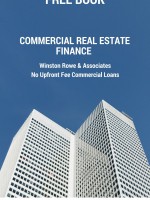How to Retire Early Through Real Estate Investing
Saturday, August 3, 2019 -
Article by:
Winston Rowe and Associates - Winston Rowe & Associates -
![]()
Real estate investment can be a tricky business, but when it's done right, it can be rewarding for you and your retirement account.
Whether you are thinking of investing in real estate or you already have a few properties under your belt, with the right steps, it is possible for you to build a successful early retirement fund. Of course, this sort of goal doesn't happen overnight.
This takes a great deal of prep work, planning and careful choices. But if you are smart about your real estate selection, stay actively involved with your property and keep an eye on your finances, early retirement could be in your future.
When done well, you can build a comfortable nest egg much sooner than you think. If you are curious about real estate investment and the idea of early retirement, here are seven tips that can help you get that fat savings account.
Establish financial independence.
It can be difficult to retire early if you still have the burden of debt. The first step toward early retirement is making sure you are debt-free or have as little debt as possible. It can be difficult to retire early if you need to make credit card payments or pay off a loan.
Take steps to manage your expenses, such as limiting high-dollar purchases and avoiding charging items or taking out loans for projects or items you may not need. It's hard to retire if your distributions are going to someone else.
By paying off your debt, you can ensure that all money coming in will go to your living expenses.
With lower debt, you can also take steps to buy more rental properties. Stay in control with these purchases. Careful debt management can help you retire early.
Mind your income.
Retiring early requires monitoring your income. Having a successful portfolio isn't enough to warrant pulling out of the job market early. There are additional steps you need to take. Once you've cleared out your debt, it's time to look at your current income and expenses. How much money do you need to generate to cover your expenses? How much should you set aside for emergencies? Know how much you need to live comfortably before you rely on your real estate information.
Know your rental property numbers.
Another step toward early retirement is planning your investment. If you already own rental properties, how many do you have? Keep track of how much each property generates and set a goal for the amount you need to achieve.
Factor in the money required to keep your properties in favorable condition and to care for any upgrades. Be prepared for emergency repairs, as well. You never know when an issue could happen with your property.
Find the right number.
After paying off any debt, getting a grasp of your income and checking out your assets, it's time to think up your game plan. How many properties do you need to maintain your expenses? Consider everything you need to care for your personal life:
Health.
Daily care.
Bills.
Livelihood.
Spouse and family.
To retire early, you must be able to master your current finances and be prepared for anything that might come up. The last thing you want is to be blindsided by an expense you can't afford. Of course, you can always have assets ready to sell in case of an emergency.
In addition to your personal costs, consider what needs to be cared for through your investments:
Upkeep.
Repairs.
Upgrades.
Taxes.
With these numbers in mind, what is the right number to keep all those expenses in balance? Decide on a number that is achievable and comfortable for your retirement.
Reinvest in your properties.
If your plan is to retire using real estate investment, keeping your properties pristine is imperative for your livelihood. If you aren't maintaining your properties, your investment pool will not last. To retire early, you must put money into your investment to make money long-term. The key is to build up net worth on your properties. You can't retire on rentals that aren't able to bring in money.
Choose your real estate wisely.
In addition to investing in your property, it's important to choose your real estate wisely. You will not retire early by flipping houses. The risk of purchasing, fixing and selling will likely not bring in consistent long-term wealth. Select property somewhere people are moving to, not away from.
Choose an area with decent schools, a good neighborhood and good property value. Also, make sure it's in a spot that you can sell easily if need be.
Vet your tenants.
The final step toward early retirement is selecting reliable tenants and setting up your rent requirements. When choosing how much rent to charge, it's important to make it fair; otherwise, you may miss out on decent tenants.
Tenants can make or break your investment. Don't pick just anyone to rent your home. As the landlord, you really need to vet your tenants and pick the best one. If your tenant is costing you money by not paying rent, take steps to remove them (keeping in mind any legal notification requirements). Real estate depends on long-term, steady income.
Building a foundation takes patience.
Real estate investment is not for everyone. It takes time and patience, and it can be costly. However, if you are willing to put in the effort, it is possible to build a successful retirement fund and even retire early.
Didn't find the answer you wanted? Ask one of your own.
Ask our community a question.
Related Articles
Featured Lenders
Cameron Burke
Vision One Mortgage
Huntington Beach, CA
Kat Whitman
Whitman Met, Inc.
Sacramento, CA
Lisa Stepp
RBS Citizens
Clifton Park, NY



